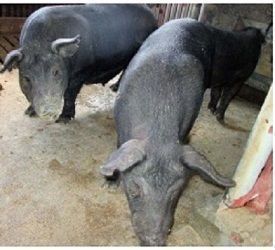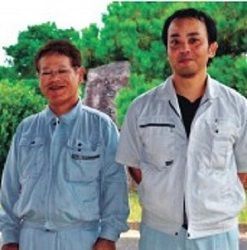Okinawa plans to improve their Agu pig stock by freezing genetic material of select specimens

Okinawa’s Agu Pig – September 1, 2017 Nakijin, Okinawa (image provided by the Okinawa Livestock Research Center)
September 6, 2017 Ryukyu Shimpo
Okinawa Prefecture is moving forward with a plan to freeze the semen of select Agu pigs, the native pig breed in Okinawa.
As part of a plan to improve Okinawa Agu pork, pigs that grow quickly and produce the best meat will have their semen frozen, which will thereafter be distributed to pig farmers.
Currently, they are developing a DNA chip that can effectively analyze genetic capacity of the pigs as well as a method for sorting animals for superior breeding.
A trial distribution of frozen pig semen to farmers could begin as early as the beginning of next year.
While the Agu pig has an already established reputation for their quality meat, the expectation is that breeding animals with the best genes will

Okinawa Livestock Research Center scientists Genji Oyadomari (left) and Tsugihira Toma – Nakijin, Okinawa
produce even better results, with the hopes that this, “leads to the tastiest pork in the world,” as someone connected to the project enthused.
The research is being conducted by the Okinawa Livestock Research Center in Nakijin, and centers around frozen preservation technology for semen, and establishing an improved breeding process by effectively utilizing the full Agu pig genome that was decoded in 2015.
A similar undertaking for improving Japanese beef based on bovine growth and meat quality using frozen bovine semen is also underway.
While Agu pork has a good reputation for the quality of its meat, breeding among a small herd over a long period of time has led to extremely weak reproductive power, at the heart of which was the reliance on natural breeding.
Research up until now has determined that the first 50 milliliters discharged at ejaculation contained the highest semen content, and that
using a tube when artificially inseminating the female led to a higher conception rate.
The process of freezing semen can also eliminate or deactivate pathogens which can wreak havoc on the livestock business,
causing miscarriages and stunted growth.
Additionally, the ability to ship in the summer, when storage issues lead to a reduced copulation rate, will also lead to a healthier livestock industry overall.
If frozen semen can be used sustainably, it will allow the best genes to be used for much longer.
The native Okinawan Agu has trouble building its brand and cannot be transported off the island, and its continued existence would be put in jeopardy if there were an epidemic of a livestock-affecting disease such as foot-and-mouth disease.
It is also expected that by sustainably using frozen semen, it would allow for the elimination and prevention of genetic disorders.
Two researchers from the Livestock Research Institute, Genji Oyadomari and Tsugihira Toma, commented, “Agu exist only in Okinawa, and we feel it is important to preserve and improve their exceptional bloodline. We hope it leads to an improvement of the Agu brand.”
(English translation by T&CT and Sam Grieb)
Previous Article:Descendants outraged as Chibichiri Gama found vandalized, collected remains destroyed
Next Article:Okinawa City sets Guinness World Record for longest origami crane lei on local Day of Peace
[Similar Articles]
- Scientific research quantifies delicious quality of Agu brand pork
- World’s first commercial technology to freeze pig sperm enables stable production of Agu brand pork
- Okinawa hosts international pork research conference, presents efforts to increase brand recognition for Agu Pork
- Agu pork from Okinawa to be sold in Singapore for the first time
- International exports of Okinawan pork grow rapidly, and production of the agu brand increases 63 times
 Webcam(Kokusai Street)
Webcam(Kokusai Street)


